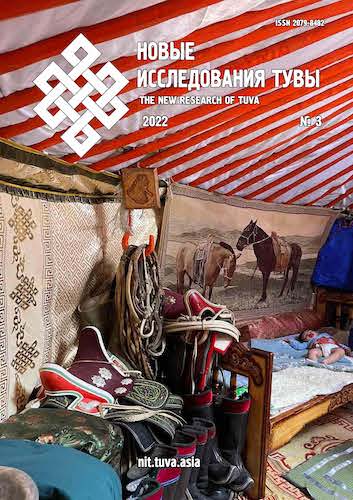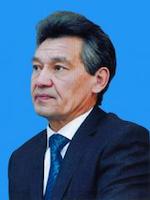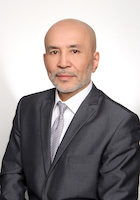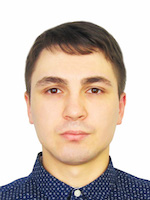Issues of human potential development in the republics of the Russian Federation (according to the results of a survey of experts in Dagestan and Tuva)
DOI:
https://doi.org/10.25178/nit.2022.3.12Keywords:
human potential; Dagestan; Tuva; social development; expert opinionAbstract
The article deals with studying issues and features concerning the development of human potential in the national republics of the Russian Federation through the examples of Dagestan and Tuva. The presented observations and conclusions are based on the analysis of statistical data and expert assessments of representatives of both republics received in 2020–2021. It has been found out that the republics have similar features in their development, primarily in the economic, social and demographic spheres (a low level of economic development, a significant number of unemployed population, a high birth rate), and their own characteristics related to the ethnic specifics of their development (language, culture, religion, traditional economic activities, etc.).
In the republics of Dagestan and Tuva, a certain attention is paid to the development of human potential, but it is insufficient. This is primarily due to the general economic situation in the country and the ins and outs of the development of the territories. Neither Dagestan nor Tuva has large modern production facilities. This fact negatively affects not only the economic development of these territories, but also their social sphere. There is an overabundance of labor force in the republics and it remains unclaimed in the economies of the regions. These factors are accompanied by a high birth rate and cause migration of the population to other regions. The development of private entrepreneurship is hindered by the imperfection of legislation, corruption and the shadow economy, paternalistic sentiments of the population, disbelief in social justice, etc.
The current problems negatively affect the development and reproduction of the human potential of the republics in the following fields: education and personal development of the younger generations (insufficient number of preschool and educational institutions, overcrowding in children’s groups and classrooms, lack of teachers and educators); health care system (lack of medical personnel, polyclinics, hospitals, equipment); day-to-day leisure (lack of theaters and cinemas, cultural centers, libraries and sports facilities). There are also a lack of permanent and reliable Internet access in various regions of the republics.
Experts associate the overcoming of existing problems in the development and realization of human potential with the implementation of reforms in the field of management and with a more consistent fight against localism and corruption.
References
Abylkalikov, S. I. and Baimurzina, G. R. (2022) Osobennosti demograficheskikh protsessov v gorodakh Kyzyl i Elista v 2011–2020 gody: sravnitel’nyi analiz [Demographic processes in the towns of Kyzyl and Elista in 2011–2020: A comparative study]. New Research of Tuva, no. 2, pp. 34–52. (In Russ.). DOI: https://doi.org/10.25178/nit.2022.2.3
Akhmetova, G. F. (2022) Migratsionnye protsessy v natsional’nykh respublikakh s raznym urovnem razvitiia chelovecheskogo potentsiala (na primere Bashkortostana, Tatarstana i Tuvy) [Migration processes in national republics with different levels of human development: the cases of Bashkortostan, Tatarstan and Tuva]. New Research of Tuva, no. 2, pp. 53–69. (In Russ.). DOI: https://doi.org/10.25178/nit.2022.2.4
Balakina, G. F. (2022) Riski razvitiia chelovecheskogo potentsiala etnicheskikh obshchnostei Respubliki Tyva (1999–2021 gg.) [Risks in human development in ethnic communities of the Republic of Tuva (1999–2021)]. New Research of Tuva, no. 2, pp. 20–33. (In Russ.). DOI: https://doi.org/10.25178/nit.2022.2.2
Balakina, G. F. and Anaiban, Z. V. (1995) Sovremennaia Tuva: sotsiokul'turnye i etnicheskie protsessy [Contemporary Tuva: Socio-cultural and ethnic processes]. Novosibirsk, Nauka. 137, [2] p. (In Russ.).
Balakina, G. F. and Kylgydai, A. Ch. (2015) Etnoregional'nye modeli adaptatsii k rynku truda v Tuve [Ethno-regional models of adaptation to the labor market in Tuva]. Kyzyl, Tuvan Institute for Exploration of Natural Resources of the Siberian Branch of the RAS. 160 p. (In Russ.).
Valiakhmetov, R. M. (2020) Etnicheskie faktory neravenstva v kontekste kontseptsii chelovecheskogo razvitiia [Ethnic factors of inequality in the context of the concept of human development]. In: Pozitivnyi opyt regulirovaniia etnosotsial'nykh i etnokul'turnykh protsessov v regionakh Rossiiskoi Federatsii [Positive experience in regulating ethno-social and ethno-cultural processes in the regions of the Russian Federation] / ed. by G. F. Gabdrakhmanova, G. I. Makarova and L. V. Sagitova. Kazan, Marjani Institute of History of Tatarstan Academy of Sciences. 196 p. Pp. 35–38. (In Russ.).
Valiakhmetov, R. M., Baimurzina, G. R., Turakayev, M. S. and Samba, A. D.-B. (2021) Etnosotsial’nye osobennosti zaniatosti naseleniia v respublikakh Tuva i Bashkortostan [Ethnic and social features of employment in the republics of Tuva and Bashkortostan]. New Research of Tuva, no. 4, pp. 206–222 (In Russ.). DOI: https://doi.org/10.25178/nit.2021.4.15
Gaifullin, A. Yu. (2022) Etnodemograficheskie kharakteristiki molodezhi v respublikakh Tyva i Bashkortostan [Ethnodemographics of youth in the republics of Tuva and Bashkortostan]. New Research of Tuva, no. 2, pp. 128–142. (In Russ.). DOI: https://doi.org/10.25178/nit.2022.2.9
Garipova, G. R. and Bodgan, E. A. (2022) Problemy razvitiia geokul’turnogo brendinga v Tuve i Bashkortostane [Developing geocultural branding in Tuva and Bashkortostan]. New Research of Tuva, no. 2, pp. 115–127. (In Russ.). DOI: https://doi.org/10.25178/nit.2022.2.8
Golenkova, Z. T., Goliusova, Yu. V. and Samba, A. D.-B. (2021) Transformatsiia regional'nogo sotsial'no-professional'nogo prostranstva (na primere Respubliki Tyva) [Transformation of the Regional Social and Professional Space (on the Example of the Republic of Tyva)]. Sotsiologicheskaia nauka i sotsial'naia praktika, vol. 9, no. 3, pp. 167–183. (In Russ.). DOI: https://doi.org/10.19181/snsp.2021.9.3.8440
Guseinov, A. G. (2015) Konfliktogennyi potentsial v polietnicheskom makroregione: institutsional'nyi podkhod [Conflict potential in a multiethnic macroregion: The institutional approach]. In: Regional'naia sotsiologiia: problemy konsolidatsii sotsial'nogo prostranstva Rossii [Regional sociology: Problems of consolidation of the social space of Russia] / ed. by V. V. Markin. Moscow, Novyi khronograf. 624 p. Pp. 329–346. (In Russ.).
Zaripov, A. Ya., Huseynov, A. H. and Maluchiev, G. S. (2022) Otsenka sotsial’no-ekonomicheskogo polozheniia regiona cherez prizmu etnicheskoi identichnosti (po materialam sotsiologicheskogo issledovaniia v Respublike Dagestan v 2020 g.) [Socio-economic situation in the region through the prism of ethnic identity: Materials of sociological research in the Republic of Dagestan in 2020]. New Research of Tuva, no. 2, pp. 85–101. (In Russ.). DOI: https://doi.org/10.25178/nit.2022.2.6
Lamazhaa, Ch. K. (2021) Tuva kak limitrofnaia zona: iazyk, religiia i identifikatsiia naseleniia [Tuva as a limitrophe zone: Language, religion and people’s identity]. New Research of Tuva, no. 3, pp. 178–194 (In Russ.). DOI: https://doi.org/10.25178/nit.2021.3.14
Lamazhaa, Ch. K., Valiakhmetov, R. M. and Samba, A. D.-B. (2022) Problemnoe pole issledovanii chelovecheskogo potentsiala Tuvy: obzor literatury i mneniia ekspertov (2020–2021) [The problem field of studying human development in Tuva: A survey of literature and expert opinions (2020–2021)]. New Research of Tuva, no. 2, pp. 6–19. (In Russ.). DOI: https://doi.org/10.25178/nit.2022.2.1
Musaev, I. M. and Maluchiev, G. S. (2016) Professional'nyi status uchitelia v Dagestane: protivorechiia praktiki [Teacher’s occupational status in Dagestan: Contradictions of practice]. Konfliktologiia, no. 4, pp. 290–303. (In Russ.).
Severnyi Kavkaz: vzgliad iznutri. Vyzovy i problemy sotsial'no-politicheskogo razvitiia [The North Caucasus: Views from within. Challenges and problems of socio-political development] (2012) / ed. by A. G. Matveeva, A. Yu. Skakov and I. S. Savin. Moscow, Institute of Oriental Studies of the Russian Academy of Sciences. 172 p. (In Russ.).
Tarbastaeva, I. S. (2018) Tuva prevrashchaetsia v monoetnichnyi region: riski i perspektivy [Tuva’s transformation into a monoethnic region: Risks and possibilities]. EKO, no. 5 (527), pp. 65–80. (In Russ.).
Turakayev, M. S. (2022) Etnoiazykovaia situatsiia kak faktor sotsial’nogo samochuvstviia regiona v natsional’nykh respublikakh Rossii (na primere Tuvy, Bashkortostana i Kalmykii) [Ethno-linguistic situation as a factor in the social well-being of the Republics of Russia: The cases of Tuva, Bashkortostan and Kalmykia)]. New Research of Tuva, no. 2, pp. 70–84. (In Russ.). DOI: https://doi.org/10.25178/nit.2022.2.5
Shakhbanova, M. M. (2013) Etnicheskaia identichnost' i strategii mezhetnicheskogo povedeniia malochislennykh narodov Respubliki Dagestan [Ethnic identity and strategies of interethnic behavior of the small peoples of the Republic of Dagestan]. Makhachkala, Institute of History, Archeology and Ethnography, DSC, RAS ; ALEF. 390 p. (In Russ.).
Eldarov, E. M. (2008) Dagestan: faktory razvitiia sel'skoi sistemy rasseleniia v postsovetskii period [Dagestan: Factors of development of the rural settlement system in the post-Soviet period]. Kavkaz i globalizatsiia, vol. 2, no. 1, pp. 105–115. (In Russ.).
Kazenin, K. and Kozlov, V. (2021) Ethnicity and fertility of descendants of rural-to-urban migrants: the case of Daghestan (North Caucasus). Journal of International Migration and Integration. DOI: https://doi.org/10.1007/s12134-021-00848-8
Published
How to Cite
For citation:
Valiakhmetov R. M., Zaripov A. Ya. and Turakayev M. S. Problemy razvitiia chelovecheskogo potentsiala v respublikakh Rossiiskoi Federatsii (po rezul’tatam oprosa ekspertov v Dagestane i Tuve) [Issues of human potential development in the republics of the Russian Federation (according to the results of a survey of experts in Dagestan and Tuva)]. New Research of Tuva, 2022, no. 3, pp. 170-185. (In Russ.). DOI: https://www.doi.org/10.25178/nit.2022.3.12
Issue
Section

This work is licensed under a Creative Commons Attribution-NonCommercial 4.0 International License.

Author(s) license holder(s) grant rights for their work to the journal (grantee of a license) under the simple non-exclusive open license in accordance with Art. 1286.1 «Open license for a research work, work of literature or fine arts», Civil Code of the Russian Federation.
New Research of Tuva publishes articles under the Creative Commons Attribution-NonCommercial license (CC BY-NC).
Since it is an open license, author(s) reserve the right to upload the article to their institutional repository, submit it to another journal (if it allows republications), or republish it on their own website (in full, or in part).
However, several conditions apply here:
a) The republished version must always contain the name(s) and affiliation(s) of the author(s), the original title and the hyperlink to the original version on the New Research of Tuva website;
b) It must be in open access, free of charge, and no category of readers must be in any way whatsoever advantaged over general readership.
c) should the contribution be submitted elsewhere by its author(s) without substantial modification (30% or more of original text unchanged), the body of the article should contain a disclaimer that the original version was published in New Research of Tuva (with a link to the respective page)
The CC-BY-NC is a non-revocable license which applies worldwide and lasts for the duration of the work’s copyright.











